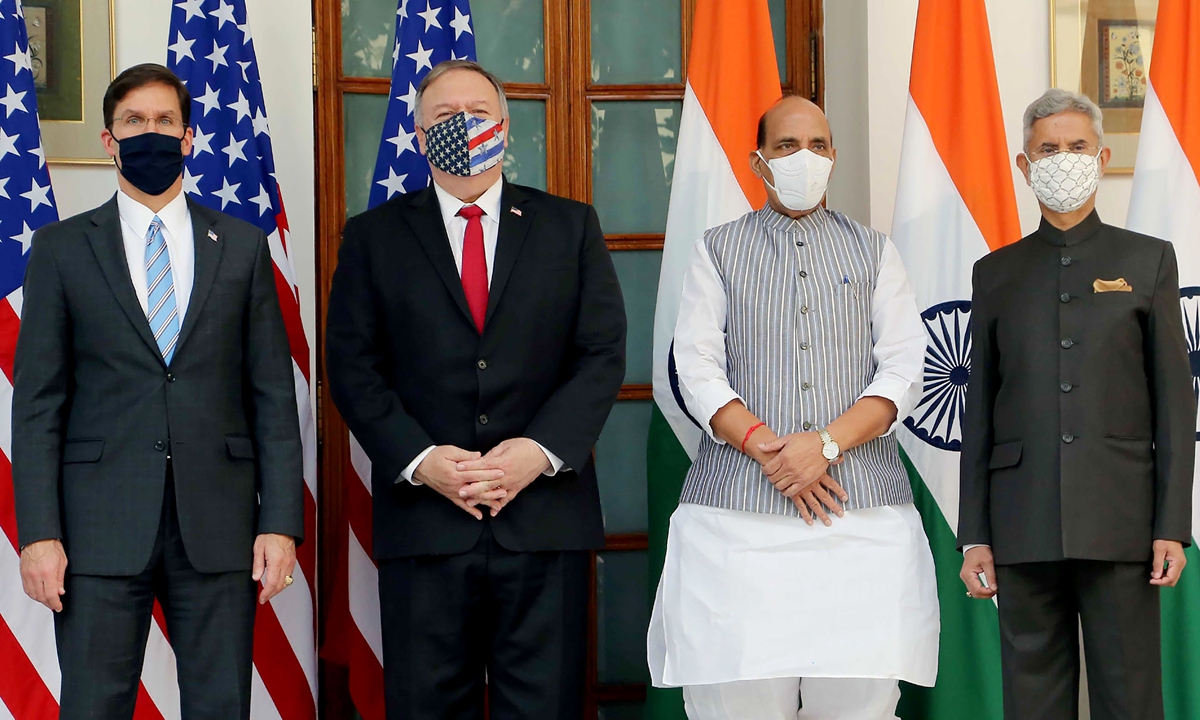New Delhi alert to US involvement in India-China disputes
Source: Global Times Published: 2020/11/2 20:26:29

India's Union Minister for Defense, Shri Rajnath Singh (2R), India's Union Minister for External Affairs, Subrahmanyam Jaishankar (R) with the US Secretary of Defense Mark Esper (L) and the US Secretary of State Mike Pompeo (2L) pose for pictures before their meeting at Hyderabad House in New Delhi. Photo: AFP/PIB
The US State Department agreed to amend its version of Indian Defense Minister's comments at the US-India 2+2 Ministerial Dialogue on October 27 after days of protests by the Indian government, reported The Hindu, an Indian newspaper.
In the original transcript released by the US, the Indian defense minister was reportedly quoted as saying that India is challenged by "reckless aggression on our northern borders." This is an implicit reference to China. New Delhi later denied that the minister had used the words, but Washington claimed that the transcript was prepared from an audio recording of the Indian side interpreter's English language delivery to the US. Washington has eventually changed the controversial line to simply note the "challenges" India is facing.
In the face of US wordplay, New Delhi's insistence to change the wording and Indian media's exposure of the matter reflects two concerns that the country holds.
First, India aims to backtrack after making two steps forward to the US side by signing the Basic Exchange and Cooperation Agreement (BECA) and reaching a consensus on some other issues with the current US administration during the 2+2 meeting. By insisting on revising the controversial rhetoric which alludes to China, India was taking a step back for China. This is India's strategy.
Second, India has been more or less sticking to the principle of limiting the border issue with China. So far, India has not taken the initiative to pull the US into the China-India conflict on border in a certain sense. This is an established policy in India.
This is not the first time that the US juggles words. US President Donald Trump in May claimed that he had spoken to Indian Prime Minister Narendra Modi about the standoff between the People's Liberation Army and the Indian Army at the LAC - further saying that Modi was not "in a good mood" about it. But Indian Ministry of External Affairs denied that any such conversation had taken place, according to Indian media reports.
Washington has been hoping to drive a wedge between Beijing and New Delhi. India has been reluctant to be pushed into the frontline by the US to counter China. That is why India rushed to clarify the conversation in May and US' misunderstanding of Indian defense minister's address this time. However, India released this information by its media outlets instead of making an official statement. This shows the country's prudent stance.
It also signals India's consistent stance on China-US relations. India endorses the US' anti-China position, yet it is unwilling to be pushed into the frontline by the US to check and balance China. New Delhi is willing to negotiate with Beijing on the border issues, but does not need Washington to pile pressure on it. What India needs most from the US is pragmatic benefits. Signing the BECA with the US and purchasing US' advanced weaponry will help India enhance its national power. Even so, India is still reluctant to provoke China in rhetoric with the US in a bid to avoid misunderstandings in Beijing.
Indian External Affairs Minister Subrahmanyam S. Jaishankar said on Saturday that India's relations with China had remained for three decades, "but as the pandemic unfolded, the relationship has come under severe stress." He also said, "To restore normalcy, agreements between the two countries must be respected scrupulously in their entirety."
As the China-India border deadlock persists, it is difficult to predict where the bilateral ties will head in the future. Three weeks has passed since the 7th round of China-India military commanders' talks. According to Indian media reports, New Delhi disapproves of the scenario proposed by Beijing to ease the border conflicts.
Meanwhile, India hopes to exploit closer relations with US to ramp up its bargaining chips with China.
Against the backdrop of closer India-US ties, China will not make any concessions. It will weigh more options over the border issue with India.
The article was compiled by Global Times reporter Wan Lin based on an interview with Lin Minwang, a research fellow with the Institute of International Studies at Fudan University. wanlin@globaltimes.com.cn
Posted in: ASIAN REVIEW